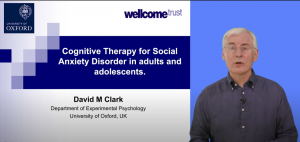Master Clinician webinar series
Cognitive therapy for Social Anxiety Disorder in adults and adolescents
Professor David M Clark (University of Oxford)

This approx. 3hr Master Clinician series webinar was recorded in September 2020.
AACBT members can view for free.
Non-members may purchase here.

As CT-SAD has been consistently shown to be more effective than a range of other psychological and pharmacological treatments for SAD, familiarity with its key features is likely to enhance a practitioner’s clinical practice.
In the absence of treatment, social anxiety disorder (SAD) is the most persistent of all the anxiety disorders. It prevents people from realising their full potential and holds them back in many areas of life. Cognitive therapy for social anxiety disorder (CT-SAD) is a distinctive treatment approach that focuses on changing the maintenance processes in the Clark & Wells (1995) cognitive model of SAD. Randomised controlled trials in the UK, Germany, Japan, Norway, and Sweden have shown that it is more effective than exposure therapy, group CBT, interpersonal psychotherapy, brief psychodynamic psychotherapy, attention placebo, medication (SSRIs), and placebo medication. This presentation will focus on the distinctive features of the treatment, which will be richly illustrated with video clips. Most of the clinical trials have so far focused on adults. However our recent pilot work suggests that CT-SAD may be at least as effective as a treatment for adolescents. For this reason, the presentation also discusses use with adolescents.
Key Learning Objectives
- To understand the key psychological processes that maintain social anxiety disorder, according to the Clark & Wells (1995) model.
- To be familiar with the distinctive procedures that are the core of CT-SAD and to know how to sequence them within a course of treatment.
- To understand how session by session measures of key process variables are used to guide the course of treatment within CT-SAD.
As CT-SAD has been consistently shown to be more effective than a range of other psychological and pharmacological treatments for SAD, familiarity with its key features is likely to enhance a practitioner’s clinical practice.
References:
Clark, D. M. (2005). A Cognitive Perspective on Social Phobia. In W. R. Crozier & L. E. Alden (Eds.), The essential handbook of social anxiety for clinicians (p. 193–218). John Wiley & Sons Ltd.
Clark, D. M., Ehlers, A., Hackmann, A., McManus, F., Fennell, M., Grey, N., Waddington, L., & Wild, J. (2006). Cognitive therapy versus exposure and applied relaxation in social phobia: A randomized controlled trial. Journal of consulting and clinical psychology, 74(3), 568–578.
Free resources for therapists treating social anxiety disorder with cognitive therapy from University of Oxford.
Biographical Information
David M Clark is the Professor of Experimental Psychology at the University of Oxford. He is well-known for his pioneering work on the understanding and psychological treatment of anxiety disorders: especially panic disorder, social anxiety disorder, health anxiety and PTSD. Recently, he has also focused on how to disseminate effective psychological treatments within healthcare systems and is one of the architects of the English Improving Access to Psychological Therapies (IAPT) programme. David is the UK Government’s Clinical and Informatics Advisor for the program.
He is a Fellow of the British Academy, the UK Academies of Medical Sciences and Social Sciences, the British Association of Behavioural Psychotherapies, ABCT, and APS. He is also a Founding Fellow of the Academy of Cognitive Therapy. He was made a Commander of the British Empire (CBE) for services to mental health in 2013.
Professor Clark’s research mainly focuses on cognitive approaches to the understanding and treatment of anxiety disorders.
The research has led to the development of new and effective cognitive therapy programmes for three different anxiety disorders: panic disorder, social phobia, and posttraumatic stress disorder, each of which are recommended first line treatment options in current NICE guidelines.
Images supplied

